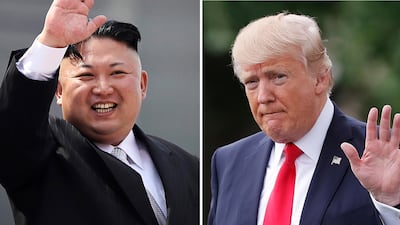As the United States and North Korea trade fresh threats of military force, non-proliferation experts are increasingly concerned about conversation boiling over into a military confrontation that would bring what they believe would be "unmitigated disaster".
The National spoke to Alexandra Bell, the Senior Policy Director at the Center for Arms Control & Non-Proliferation to evaluate the situation. Ms Bell, who until January was the Director for Strategic Outreach in the Office of the Under Secretary for Arms Control and International Security at the Department of State, expressed alarm over the harsh language traded between Donald Trump and Kim Jong-un and urged a swift return to the negotiating table.
JK: How dangerous is the escalatory rhetoric between US President Donald Trump and North Korean leader Kim Jong-un?
AB: It’s incredibly dangerous, since either side misinterpreting or misunderstanding provocative statements could have serious consequences. In the past, U.S. leaders have ignored North Korea’s rhetorical bait and worked through proper diplomatic channels. That is no longer the case.
JK: In that context, how serious are the military threats we are hearing from Mr Trump and from the North Korean leadership in respect to Guam?
AB: The threats themselves might be for show, but a conflict between the United States and North Korea would be devastating. As a matter of posturing, leaders can deliver harsh statements in public to set a tone for forthcoming formal talks. In this case, it might simply be the style of the leaders in question.
JK: What are the risks of a military confrontation today? How would it play out?
AB: There is no good military option. While the recent focus has been on North Korea’s nuclear program, they are suspected to have chemical and biological weapons programs. They can also launch thousands and thousands of conventional artillery shells on Seoul in a matter of minutes. The civilian casualties would be astronomical. Add to that the tens of thousands of American troops on the Korean border and in Japan that would be in harm’s way.
Put simply, a war with North Korea would be an unmitigated disaster.
JK: How did we get here? Could this have been averted?
AB: The North Koreans have been driving towards a nuclear weapons capability since the early 1990’s. That progress was halted by an agreement called the Agreed Framework for about eight years. Problems arose with that agreement and instead of the parties trying to fix those problems, the agreement was allowed to collapse.
The bottom line is that North Korea continued insistence in developing nuclear and missile capabilities is a threat to international security. The United States working with allies and partners should refrain from inflammatory rhetoric and look for a way back to the negotiating table.
_________________
Read more
We're 'locked and loaded', Trumps tells North Korea
Behind the rhetoric North Korea has jumped from regional threat to global menace
_________________
JK: President Trump has blamed previous administrations' mistakes in getting here, is that a fair assessment?
AB: The Clinton Administration confronted North Korea’s nuclear ambitions head on and were able to achieve the Agreed Framework. The problems that began to arise with the agreement were then the Bush Administration’s to handle. The Bush Administration chose not to defend or repair the deal, so it collapsed. The North Koreans tested their first nuclear weapon in 2006 towards the end of the Bush presidency.
The Obama Administration made some efforts to return to negotiations, but did not succeed. They did, however, inform the incoming Trump Administration that North Korea should be a top priority. As of yet, the United States does not even have an Ambassador in Seoul.
JK: How can we climb down from this escalation?
AB: First, both sides should stop issuing inflammatory statements. Second, the United States should work with allies and partners to create the conditions where North Korea can come back to the negotiating table. The initial focus of such talks should be an immediate freeze on North Korea’s nuclear and missile testing programs. Once achieved, larger discussions can ensue.
JK: Where do you see China’s role?
AB: China is completely critical to solving this situation, but we need to work together with them in formal diplomatic settings.


